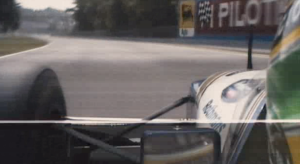Dir: Asif Kapadia | Year: 2010 | Cert: 12A | Country: UK
Running Time: 106 mins
Asif Kapadia recognised that the challenge of making a documentary about three times World Championship winner Ayrton Senna, lay in condemning nuts and bolts racing to an essentially back seat role. His film is compelling, the life drama of an exceptionally gifted individual at the height of his powers. As a working history of the Formula One machine, with all its politics, money and corruption, it is equally engrossing. And yet the actual sport of motor racing, just as it might have appeared in the psyches of the majority of us then, knows its place here, playing the supporting role to a far bigger event.
When I was given the opportunity to direct Senna, I decided the film had to work for audiences who disliked sport, or had never seen a Formula One race in their lives. It had to thrill and emotionally engage people who had never heard of Ayrton Senna.
Asif Kapadia, interview with The Guardian, Senna: Come Drive With Me, Tuesday 31st May 2011
 Kapadia’s decision to employ entirely archive footage of Senna is the masterstroke here, with the Brazilian driver eerily narrating his own life story for the most part. The material research has been meticulous, as it had to in constructing an entirely ‘source documentary’ pieced together from recorded film taken twenty years ago. Numerous home videos, Grand Prix races, interviews and news coverage all contribute to building a real sense of Ayrton Senna the man – a contrasting amalgam of playboy celebrity, religious faith, social conscience and dogged determination.
Kapadia’s decision to employ entirely archive footage of Senna is the masterstroke here, with the Brazilian driver eerily narrating his own life story for the most part. The material research has been meticulous, as it had to in constructing an entirely ‘source documentary’ pieced together from recorded film taken twenty years ago. Numerous home videos, Grand Prix races, interviews and news coverage all contribute to building a real sense of Ayrton Senna the man – a contrasting amalgam of playboy celebrity, religious faith, social conscience and dogged determination.
I had a rule with the film: if we can’t show it, we can’t put it in. Fortunately, Senna was constantly followed by a camera at the height of his fame: whether it was Globo TV from Brazil, Fuji from Japan, his brother’s VHS camera or the Formula One crews. Rather than shooting it, we scripted it and then sent word to our researchers in London, Japan and Rio to find the shots to fit.
Asif Kapadia, interview with The Guardian, Senna: Come Drive With Me, Tuesday 31st May 2011
The film retains the feel of gripping real life drama unfolding before your very eyes, a refreshing alternative to what could have been a reflective, posthumous approach relying on current day analysis to shape events. Moments of real pathos present themselves in the simplest of interview, such as when Senna reveals his future hopes after winning the Formula One Championship for a third time (Kapadia’s choice of Giles Peterson score works brilliantly here), barely three years from tragedy upon the track at Imola.
There is a great desire in me of improving. Getting better. That makes me happy….Maybe I’m only at the half of my life right now, so there is a lot to go, a lot to learn, a lot to do still in life. And happiness will come when I feel complete as a whole, which definitely I don’t feel today. But I have plenty of time to fulfill that, too.
Ayrton Senna interview post-1991 World Championship win, Senna (2010)
Scenes like these are heightened by our prior knowledge about a young life cut short and sound a sad footnote to lost potential.
Formula One fans may complain about the film’s negative depiction of technology advancements at Williams which seemingly explain away Senna’s latter championship failures at the hands of Nigel Mansell and Alain Prost. However there is no doubt that the Frenchman, presented as winning titles by accumulating points over podium finishes, played the politics of the sport better than anyone. Here, he serves as the pantomine villain for the piece although Kapadia is careful to square opinion by including later footage of Prost bearing his former team mate’s coffin at the funeral, and a final mission statement reveals him as trustee to the Senna foundation.
 The extended footage of Senna sitting in his car during the final hours of his life grant the film a doom-laden tension as sister Viviane recalls his doubts during the morning of the race.
The extended footage of Senna sitting in his car during the final hours of his life grant the film a doom-laden tension as sister Viviane recalls his doubts during the morning of the race.
He opened the Bible and read a passage which said that God would give him the greatest of all gifts. Which was God himself.
Senna’s sister, Viviane, recalls her brother’s last morning, Senna (2010)
The immediacy of Kapidia’s approach proves as exhilarating as the final in-car camera sequence prior to the crash itself. Whilst the film is the beneficiary of a subject matter boosted by the extraordinary wealth of archive footage available, it is Kapadia’s proximity to his lead man that contributes to Senna’s deserved universal appeal. Here is a celebration of documentary film making to challenge the mainstream, and a truly cinematic experience.
prior to the crash itself. Whilst the film is the beneficiary of a subject matter boosted by the extraordinary wealth of archive footage available, it is Kapadia’s proximity to his lead man that contributes to Senna’s deserved universal appeal. Here is a celebration of documentary film making to challenge the mainstream, and a truly cinematic experience.
SGM
♦ Recommended ♦




Great review, exactly my sentiments but a lot more eloquently expressed!